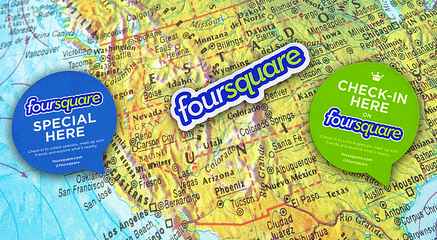Foursquare opportunists bring it on
Foursquare is Google Latitude meets Facebook, with a dash of Twitter and a dollop of Qype. It’s more addictive than a big stew of smack and crack. In less than a year, the geo-location gaming platform managed to rack up 275,000 users. Today, it’s more like 3 million.
But should we really be worried about privacy? We’ve been posting our information online, in one form or another, for ages. Common sense shall surely prevail.
For the uninitiated out there, Foursquare is a service-based social network-come game. It lets you know where your friends are and adds incentives into the mix. There are promotional deals for frequent customers, and by regularly checking and displaying their locations, users can compete to be ‘Mayor’ of specific outlets to get discounts on goods and services, free coffees and even free meals.
Geo-location increases profits
The companies that benefit most from Foursquare took to it early on. One of the first businesses to join Foursquare was Fitzrovia-based - Kaffeine. The owner of the cafe was recently interviewed on CNN, sitting next to his ‘Mayor’. You can’t beat that kind of free advertising. Dominoes have also seen their pre-tax profits rise by 37.5%. The company attribute their increased good fortune to their social media efforts and Foursquare participation.
Piecing together your details: a voyeurs wet dream
With all this excessive information floating around a person could, should they be inclined, put together a picture of where you are at any given moment, from your different social media platforms. A slow drip feed of information to different locations. It may seem harmless at the time but when taken together is telling. It’s an old argument but still a valid one.
Who needs pleaserobme.com. All a potential stalker needs is patience and diligence to yield positive results. One of Foursquare’s features is the ability to see a list of “Who’s Here?” when you check into a location. As soon as you check in, you go on the list. If you don’t disable the setting, a stranger in the same location as you can see that you're there. That person can then reach your profile, figure out where else you hang out and at what times.
But what’s really dangerous is what’s not being said on Foursquare. As you login to the platform and tell people where you are, you’re also telling them where you are not. Namely in your house, which is now free to pillage and loot. Thanks, pleaserobme.com.
Foursquare, Facebook Places and Twitter lets potential thieves piece together a picture of where you are at any one time. It’s nice to rack up mayorships, for free risottos. I like a bargain like the next (wo) man but I just find it all a bit...much.
People ask to be your friend on Facebook and Foursquare but they may not actually BE your friend. They may be that someone you met a party, that person from freshers week in 2001. But with Facebook Places those people are now letting you know that they’ve just popped into ASDA, Dominoes or wherever. Right now.
Do you really care? I hope not. I don’t.
Location-based services, like Foursquare, are great for adding into other, bigger applications, perfect for Facebook Places, which already has users familiar with regular updates. It’s a development that we’ll probably see in Foursquare and Facebook’s shared future.
Privacy gone bananas
You could just as easily say that you should never send out an update on Facebook, you should never let people know you’re on holiday, you shouldn’t post pictures on Flickr because someone will know you’re not at home. It's all getting a bit silly.
Don’t check in at work or tell anyone you have a 9-5 job because then they’ll know that you’re gainfully employed and then they’ll use Google Maps and find you and then they’ll rob you. When you’re on the phone, don’t ever mention where you are because they might be listening, those robbers, those f&%$ing robbers.
I think I might just start using Foursquare to lure thieves to my house. Sit behind the couch, with the lights out, bread knife in hand.
Photo (cc) John Fischer.



